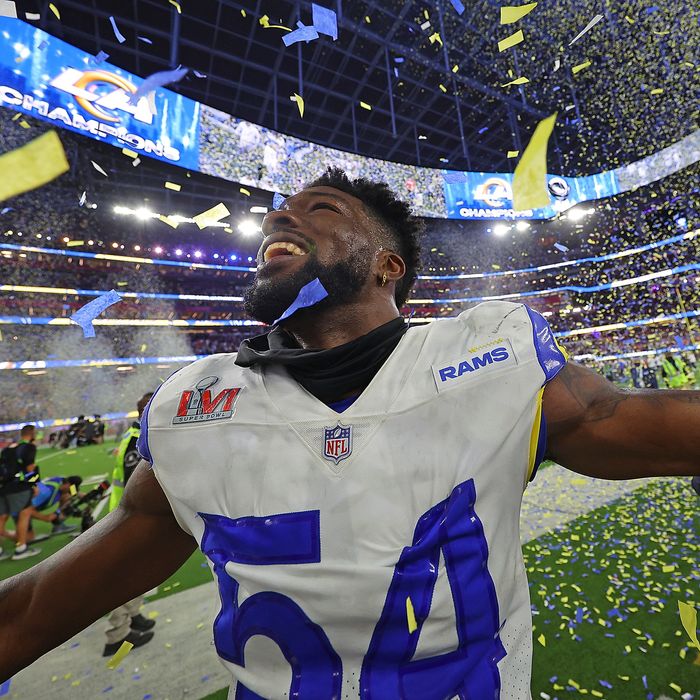
At his impressively obfuscatory annual press conference on Wednesday afternoon, NFL commissioner Roger Goodell didn’t exactly set the room on fire. He mostly stuck to his unique brand of middle-manager bro-corporate-brand speak, then addressed the recent racial-discrimination lawsuit from former Miami Dolphins coach Brian Flores with what my colleague and podcast co-host LZ Granderson correctly labeled as a “saying nothing, but with empathy” approach. But one thing did make Goodell light up and downright beam: every time he got to talk about Los Angeles.
There’s a lot to say about the Super Bowl itself on Sunday night — the riveting game that ended, frustratingly, with debated calls from the official and some super-shaky play-calling; the Rock’s pregame stint as a hype man for a league that he is ostensibly competing against; the odd and occasionally disturbing commercials; the instant all-timer of a halftime show; whatever the hell Joe Burrow was wearing pregame. But let’s pause for a moment to appreciate how perfect a match this city and its new stadium were for this spectacle. After a decade or so of Super Bowls held in Indianapolis, Detroit, Minneapolis, Jacksonville, Santa Clara, and, infamously, the frozen public-transit disaster that was East Rutherford in 2014, this year the big game returned to its roots in Los Angeles County. L.A. hosted the first-ever Super Bowl in 1967, but none since 1993. After Sunday, there will definitely not be another 29-year gap.
Goodell had already said as much in his press conference, asserting that Los Angeles will be a “regular Super Bowl stop.” Maybe it should be even more frequent than regular: Everything about the week out here made me think it should be the permanent location. The weather was unseasonably warm without a cloud in the sky (this ended up being the hottest Super Bowl ever, at a perfectly comfortable 84 degrees). The social scene felt pandemic-free. And wherever I went, pretty much anywhere in the greater L.A. area, I was surrounded by visiting fans from Cincinnati, who reminded me what the Super Bowl once was and was initially meant to be all along: a warm place for people from cold places to go in February. (Even though the game was played in the Rams’ home stadium, there were far more cheers for the Bengals, who were appearing in their first Super Bowl in 33 years.)
The whole night, and the whole week, felt like a celebration of the city. The halftime show may have been a nostalgia-laden ode to the albums your parents kept telling you not to listen to, but it was also a glorious tribute to L.A., specifically Compton, and to West Coast rap itself (though the unvaccinated Ice Cube was sadly missing from the show).
SoFi Stadium, a partially subterranean Inglewood behemoth that opened in 2020 to zero in-person fans, got its first real close-up and earned glowing reviews. The place reportedly cost nearly $6 billion to build and looks it —like a stadium aliens built in the future and then went back in time to bestow upon us. It’s almost a tourist destination by itself.
And then the Rams actually went out and won the game, becoming the second team in two years (and the second team ever) to win the Super Bowl on their home field — even if all those Bengals fans made it feel like an away game.
This all felt a bit like a victory the NFL — and definitely the Rams brass — didn’t necessarily deserve. From 1995 to 2015, there was no NFL team in Los Angeles. During that time, which coincided with the league’s explosive growth into cultural superpower, L.A. mostly served as a threat owners of franchises in other cities could invoke to force local municipalities to build them fancy new stadiums. Then Stan Kroenke, the Rams (and Arsenal) owner, bought land outside Hollywood Park and strong-armed his way out of a contract with the city of St. Louis, where his team was obligated to stay for 30 years (his maneuver ended up costing the league $790 million). The San Diego Chargers decamped to L.A., eager to share shiny SoFi Stadium with the Rams. And on Sunday night, a Los Angeles football team won a championship for the first time since the Raiders in 1984. Kroenke may be reviled in St. Louis (and North London, for that matter — go Gunners), but Kroenke still got everything he wanted. Maybe even a little bit more.
And so did the NFL. Goodell called the game a “Hollywood ending” and complimented Kroenke on building “the world’s greatest stadium.” Los Angeles is now integral to the future of the league. Someday soon, it will seem absolutely absurd that the NFL and Los Angeles were estranged from each other for so long. Sunday night was their eternal reconciliation. They’ll never be apart again.































